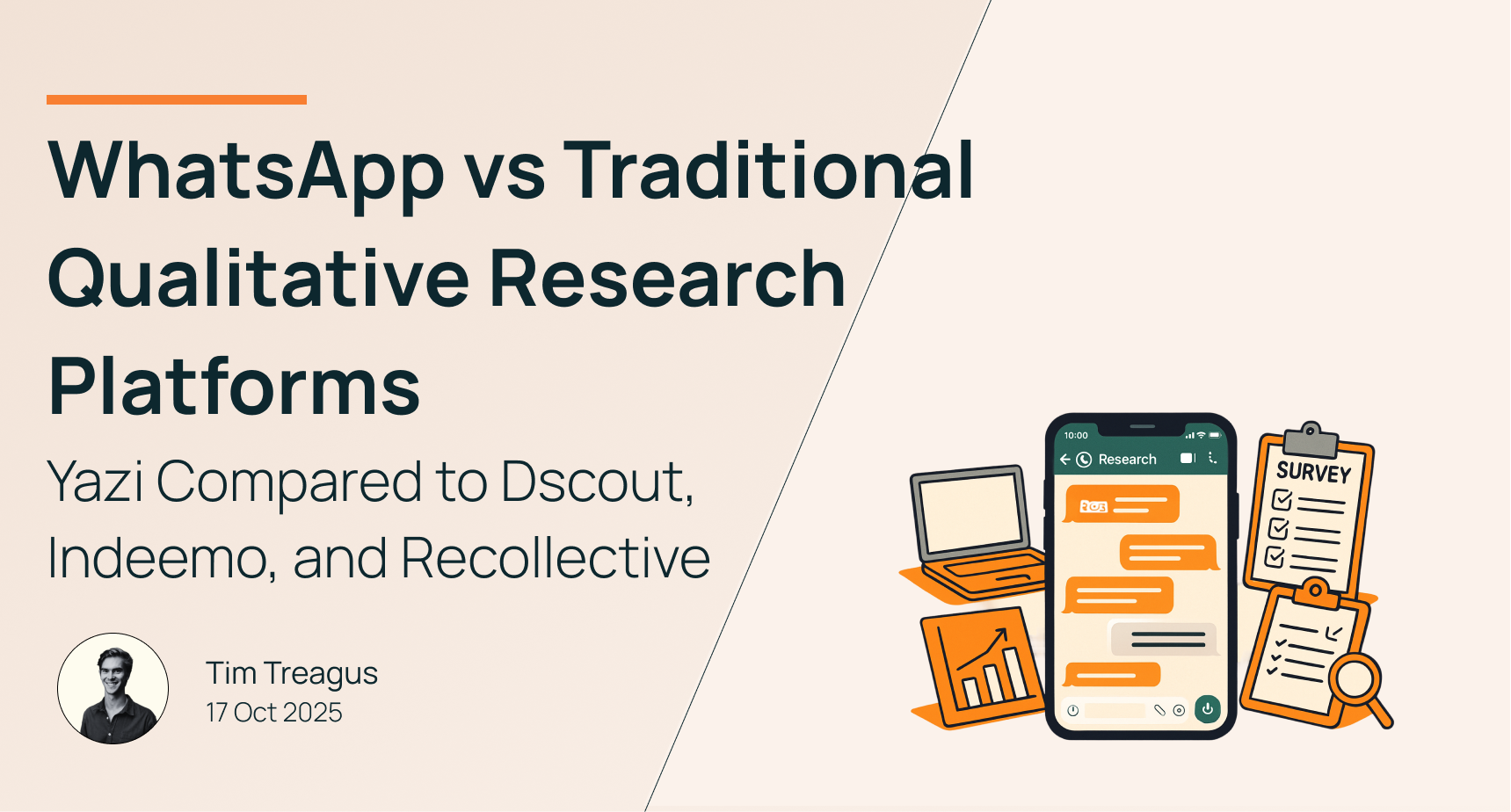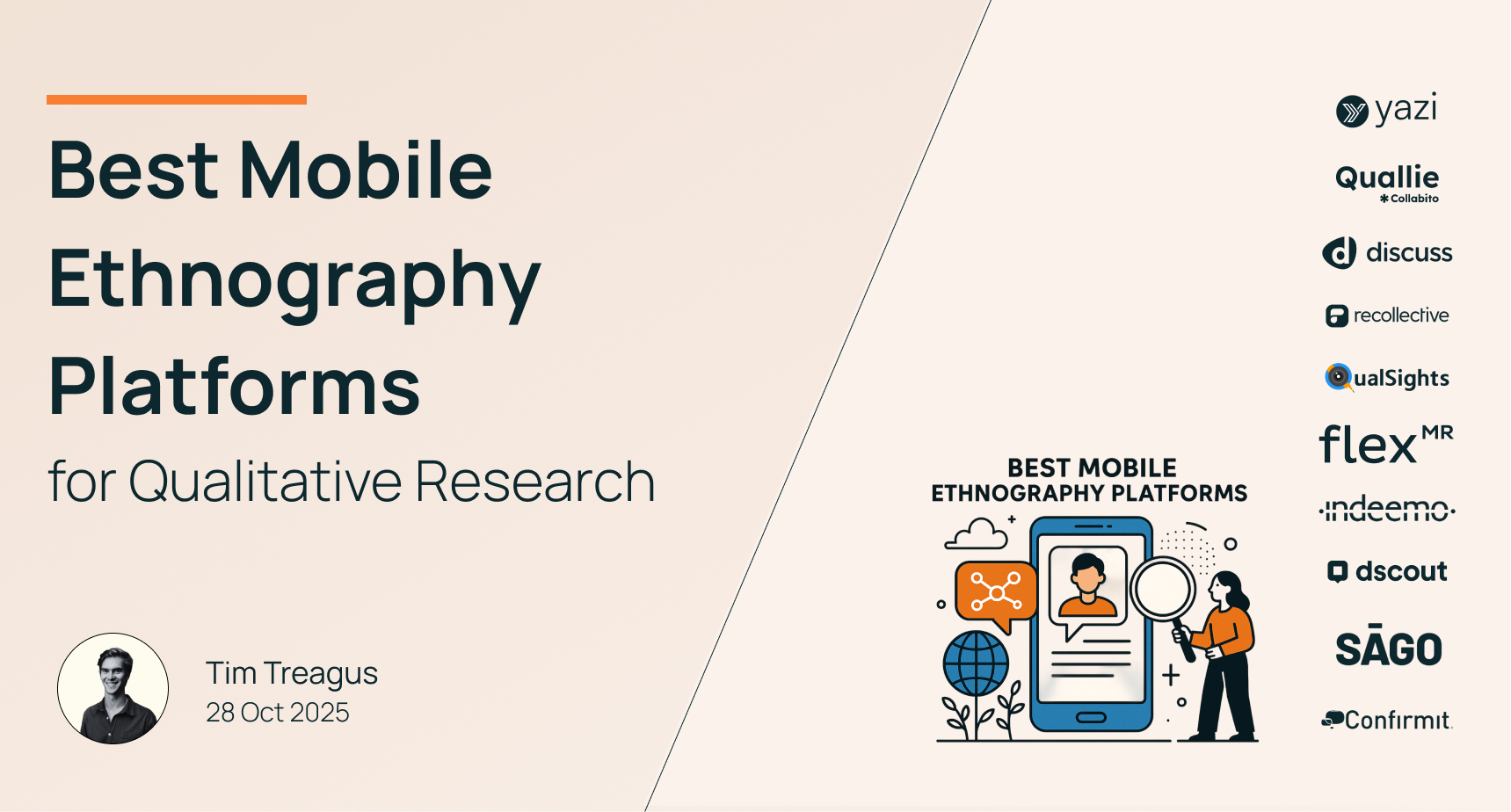Qualitative research is changing faster than most platforms can keep up with. What used to work when studies ran on laptops, email invitations and downloadable apps no longer fits how people actually communicate or behave day to day. Response rates are dropping, multi-day engagement is breaking down, and participation outside desktop-native markets is becoming harder and more expensive.
At the same time, researchers still need depth, continuity and structure. They need rich media, real-time insight and the ability to follow the same people across days or phases without losing them along the way. The problem is that most alternatives were built for a different era and assume levels of access, bandwidth, device storage and attention that no longer exist in many markets.
Yazi was built natively for the way people already interact: through WhatsApp. Instead of asking participants to download a new app, remember a password or re-open a browser tab, the entire study experience lives where people already spend their time. This fundamental shift removes the biggest source of drop-off and opens up audiences that traditional tools consistently miss.
Platform Comparison: Yazi vs Dscout vs Indeemo vs Recollective
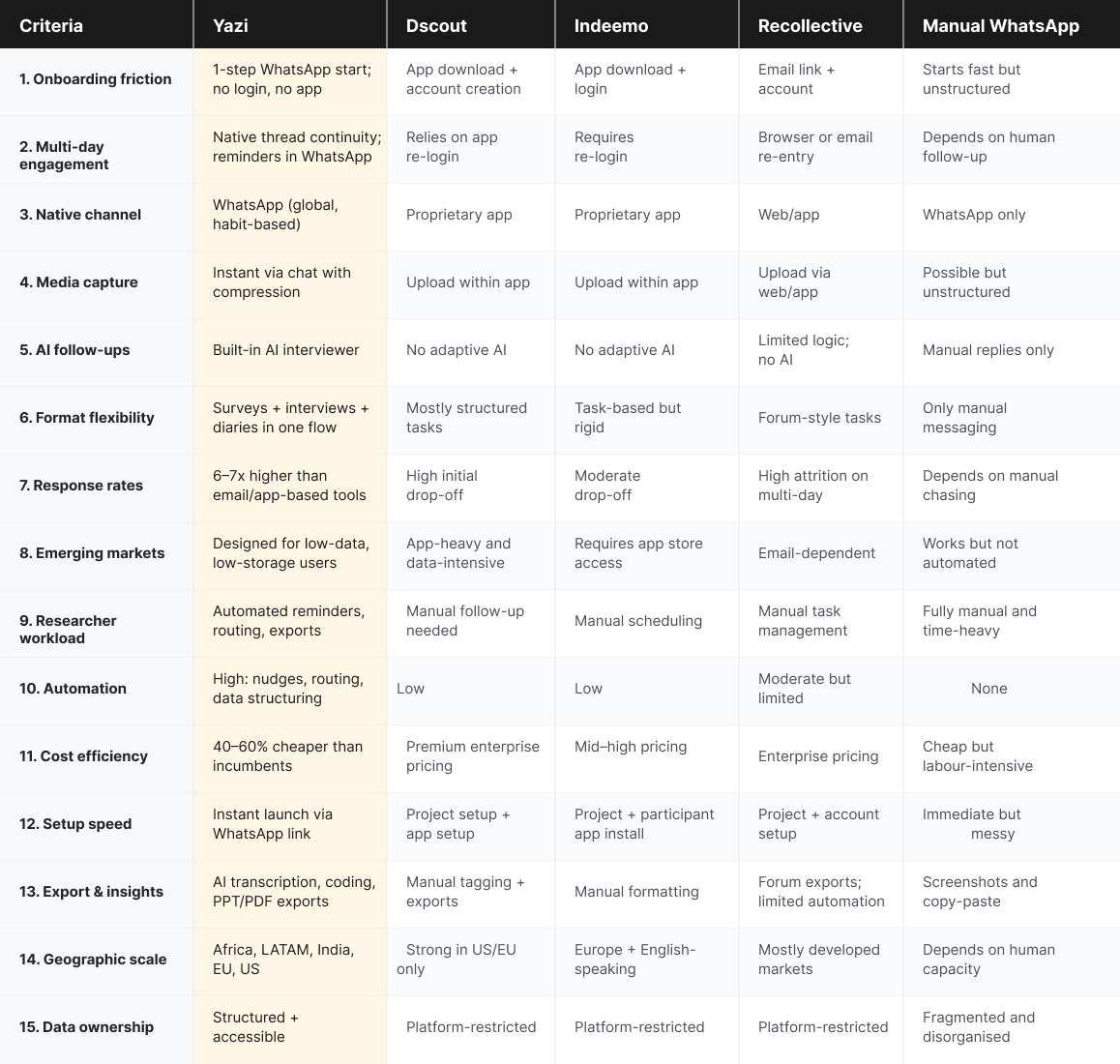
Core Advantages of WhatsApp-Based Research Platforms
1. Onboarding Friction: WhatsApp vs App-Based Tools
Why this matters: Every additional step between invitation and first response increases drop-off, especially among time-pressed or hard-to-reach participants.
Messaging-based / WhatsApp approach:
- Participants receive an invite directly in WhatsApp.
- They tap once and immediately begin.
- The process takes seconds, without downloads, accounts or passwords.
Traditional platforms:
- Participants receive an email invitation.
- They click a link to a browser or app store.
- They must download an app or wait for a webpage to load.
- They create and verify an account.
- They log in again before accessing the study.
In practice, this means a simple 3-tap flow versus a 10-step process that loses a large share of participants before the study even begins.
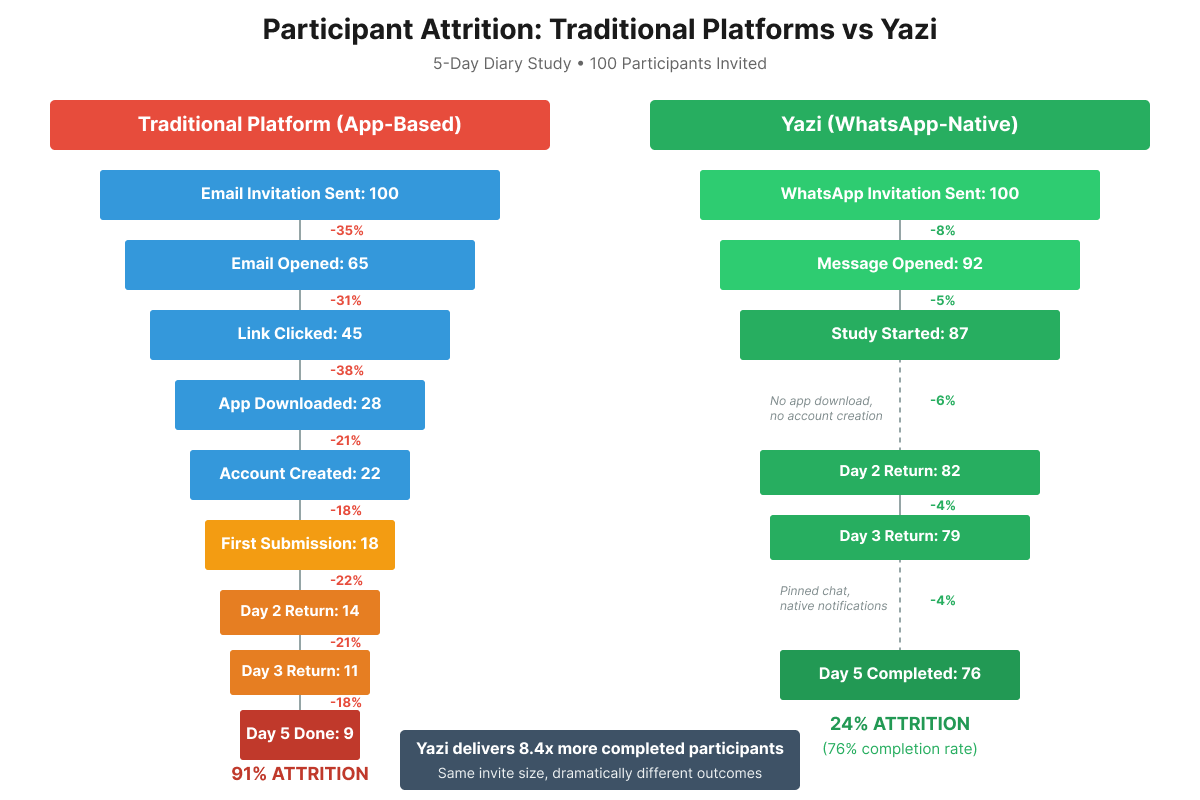
2. Multi-Day Engagement & Retention Rates
Why this matters: Qualitative studies often run over several days. If re-entry is difficult, longitudinal insight collapses into a single-day snapshot.
Messaging-based / WhatsApp approach:
- Participants return to the same chat thread each day.
- Notifications arrive as normal WhatsApp messages.
- Chats can be pinned, keeping the study top of mind.
- No re-login is required at any stage.
Traditional platforms:
- Participants must find a reminder email or app notification.
- They often face a login screen or expired session.
- Password resets or app re-downloads become common.
- Drop-out increases with every added step.
Completion rates on Day 5 can be 70–80% in WhatsApp-based studies compared to 40–55% on app-based tools.
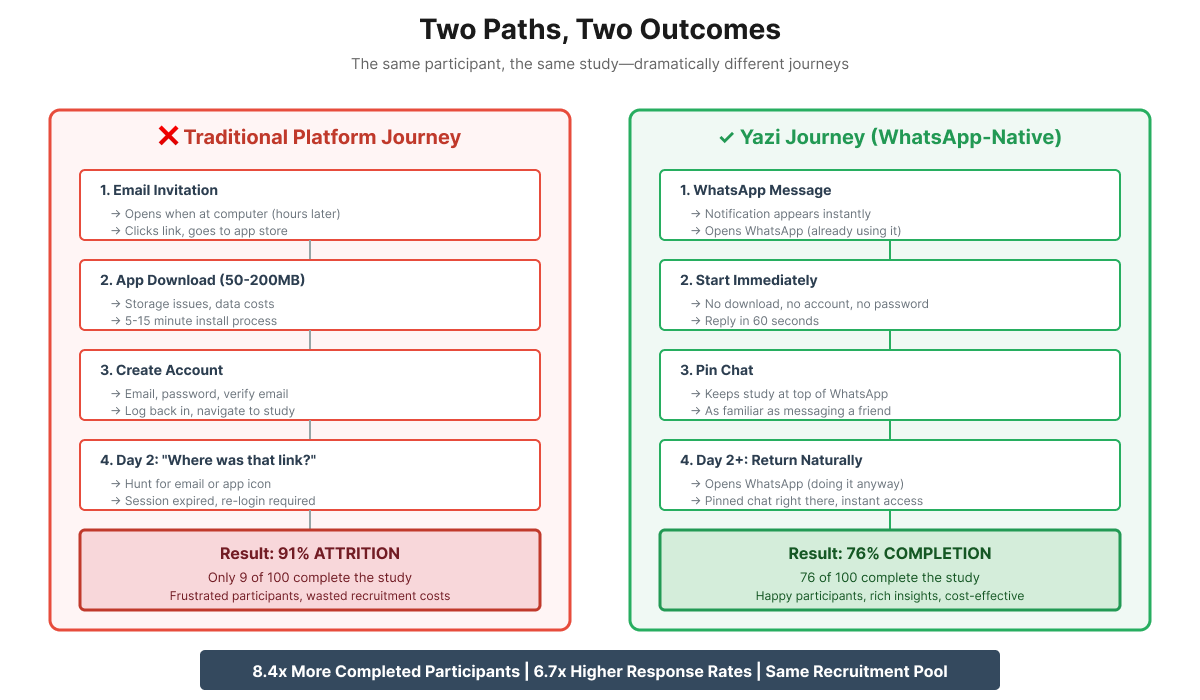
3. Native Messaging vs App/Web Platforms
Why this matters:
Context switching kills momentum. When participants must leave their natural digital environment and enter a foreign platform, you're asking them to overcome psychological and practical barriers every single time.
Messaging-based / WhatsApp approach
- Everything happens in one chat with no switching.
- Familiar controls, so no learning curve.
- Feels trusted and legitimate.
- Habit makes replies quick and natural.
Traditional platforms
- Separate app to remember and reopen.
- Email links are often missed in many markets.
- New interfaces slow people down and cause drop-off.
- Feels like work rather than a conversation.
WhatsApp & Email Penetration and Daily Usage
.svg)
4. Media Capture: Voice, Video and Photo Collection
Why this matters: Rich qualitative data comes from voice, video and images captured in the moment, not typed text hours later.
Messaging-based / WhatsApp approach:
- Voice notes can be recorded instantly while walking or commuting.
- Photos and videos are shared as easily as sending a friend a message.
- Multiple media files can be sent in one go.
- Compression keeps data costs low and uploads reliable.
Traditional platforms:
- Participants must navigate app interfaces or upload windows.
- Permissions and file size limits create extra friction.
- Uploads often fail on poor connections.
- As a result, participants default to shorter, typed responses.
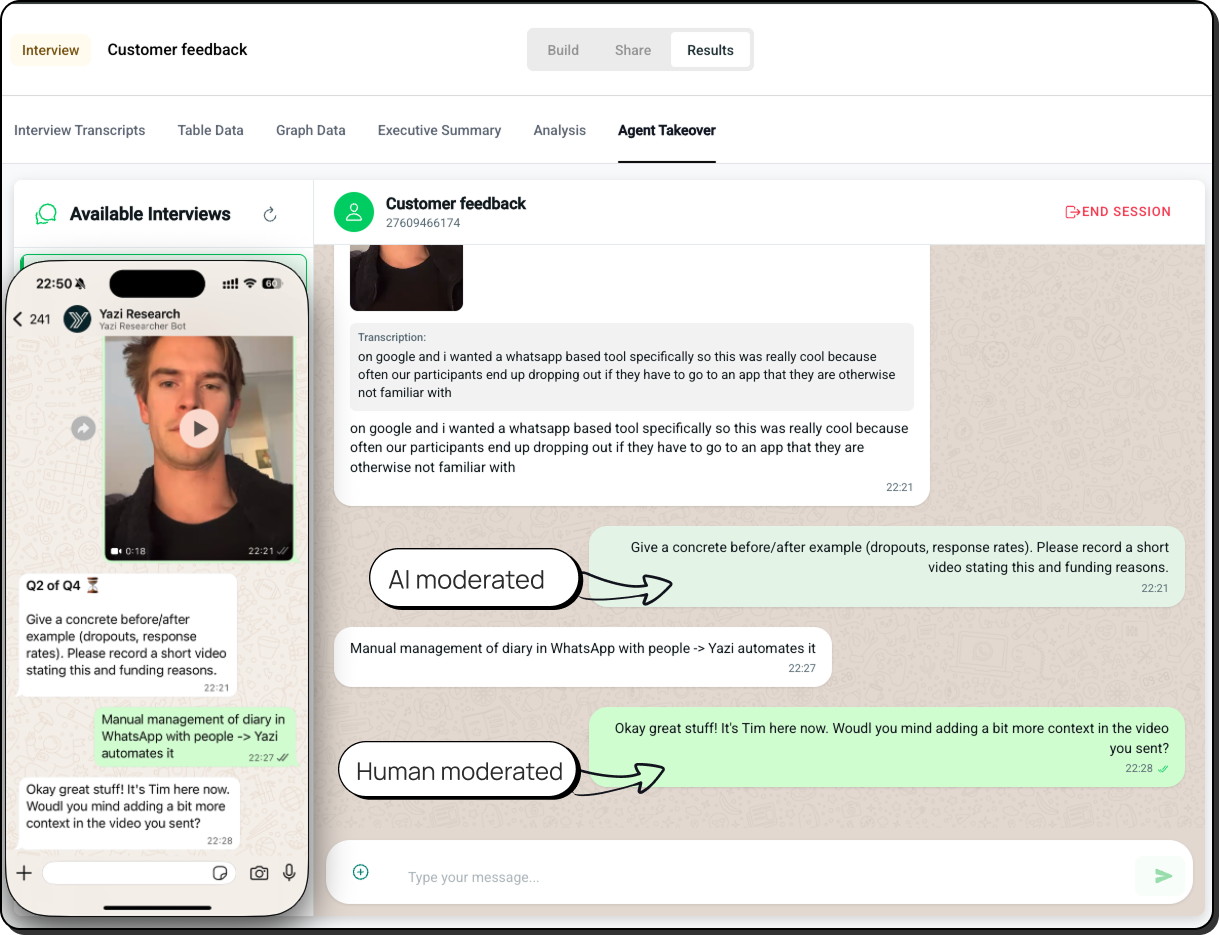
5. AI Probing & Adaptive Interviewing Capabilities
Why this matters: Depth comes from probing questions. Static surveys struggle to replicate the role of a skilled moderator.
Messaging-based / WhatsApp approach:
- AI can adapt questions based on previous answers.
- Follow-ups can be sent immediately, even at night or weekends.
- Both structured and conversational flows can run in one thread.
- Participants can answer in voice or text without friction.
Traditional platforms:
- Questions follow a pre-programmed sequence.
- Follow-ups depend on a human moderator being available.
- Responses may wait hours or days before being probed.
- Inconsistent moderation leads to uneven data quality.
6. Researcher Workload & Automation
Why this matters: Without automation, qualitative studies demand heavy manual effort — reminders, follow-ups, transcription and data organisation.
Messaging-based / WhatsApp approach:
- Automated reminders keep participants on track.
- Study phases and routing progress without intervention.
- Responses are captured consistently and stored in one system.
- Voice notes are auto-transcribed and searchable.
Traditional platforms or manual WhatsApp:
- Researchers must chase participants by hand.
- Tracking progress across days is manual.
- Moderators spend hours formatting and cleaning transcripts.
- Weekend and evening monitoring becomes unavoidable.
7. Inclusivity, Device Access & Emerging Market Suitability
Why this matters: Many participants in growth markets use older phones, limited storage, or pay-as-you-go data. Excluding them biases the sample.
Messaging-based / WhatsApp approach:
- Works on low-end devices with no new downloads.
- No email required, important in markets where email usage is low.
- Voice notes bypass literacy or typing barriers.
- Compression keeps data costs minimal.
Traditional platforms:
- Apps demand storage space or frequent updates.
- Email invitations miss large population segments.
- Data-heavy uploads discourage those with limited connectivity.
- Password and login steps cause additional confusion.
8. Cost Efficiency & Scalability Across Markets
Why this matters: Platform fees are only one part of total project costs. When 40% of your sample drops out, you over-recruit by 60%—that's recruitment cost waste. True cost comparison requires full economic modeling: platform fees, over-recruitment, researcher labor, transcription, and analysis.
Messaging-based / WhatsApp approach:
- Higher completion rates reduce over-recruiting.
- AI moderation reduces human hours.
- Automation handles reminders and routing.
- Pricing is typically 40–60% lower than app-based platforms.
Traditional platforms:
- Lower completion rates mean larger, more expensive recruitment.
- Manual moderation inflates labour costs.
- Enterprise pricing can be prohibitive for smaller projects.
- Attrition dilutes sample quality and raises incentive costs.
.png)
9. Diary Studies & Ethnographic Flexibility
Why this matters: Diary studies collapse when participants lose track of what to do or where to submit.
Messaging-based / WhatsApp approach:
- Tasks arrive in the same chat thread participants are already using.
- Linear studies can run across multiple days automatically.
- Menus allow non-linear, event-based logging.
- All media and text stay in one consistent flow.
Traditional platforms:
- Tabs are closed and rarely reopened after Day 1.
- Passwords and links are often forgotten between phases.
- Each new task requires fresh instructions.
- Data ends up split across systems and difficult to synthesise.
Summary: Strengths of WhatsApp vs Traditional Platforms
WhatsApp-Based with AI Moderation:
- Best for: Multi-day studies, emerging markets, mobile-first participants, hard-to-reach segments, in-the-moment capture, studies where completion rates determine ROI
- Wins on: Participant experience (onboarding, engagement, native messaging), response rates, cost per completed participant, researcher scalability
- Limitation: Less mature than 10-year-old platforms for some enterprise analysis features
Traditional Platforms (Dscout, Indeemo, Recollective):
- Best for: US-based studies, email-engaged professionals, desktop-heavy workflows, enterprise clients requiring established vendor relationships
- Wins on: Feature depth, brand recognition, enterprise sales support, sophisticated analysis tools
- Limitation: High onboarding friction, poor emerging market performance, lower completion rates
Manual WhatsApp:
- Best for: Small studies (5-15 participants), single-day research, exploratory pilots, extremely nuanced probing required
- Wins on: Platform familiarity, voice note adoption, zero platform costs
- Limitation: Operationally unsustainable beyond 20 participants, inconsistent moderation, massive researcher labor, no analysis tools
The core trade-off: Traditional platforms have sophisticated features but lose participants to friction before those features matter. WhatsApp-based approaches sacrifice some advanced functionality to keep participants engaged—and for most studies, completed responses beat feature lists.
Real Study Outcomes: Completion Rates & Engagement
When an Irish research agency switched from Recollective to Yazi for emerging market studies:
- Completion rates: 48% → 79%
- Over-recruitment needed: 60% → 10%
- Same-day responses: 35% → 81%
When global research agency compared Indeemo to Yazi for multi-day ethnography:
- Multi-day capability: Not available → Full 5-7 day studies
- Re-engagement: Email reminders → Native WhatsApp prompts
- Voice note adoption: 0% → 72% of participants
The pattern is consistent across 50+ studies: WhatsApp-native delivery eliminates the friction that kills traditional platform completion rates.
%202.png)
